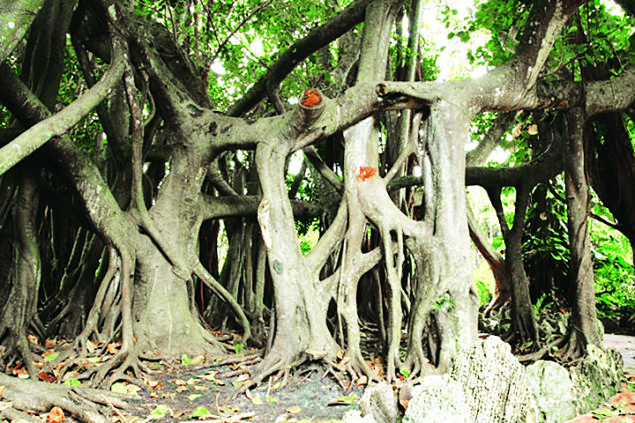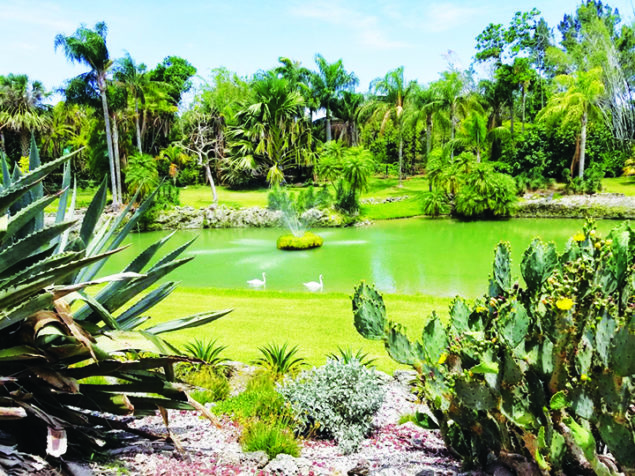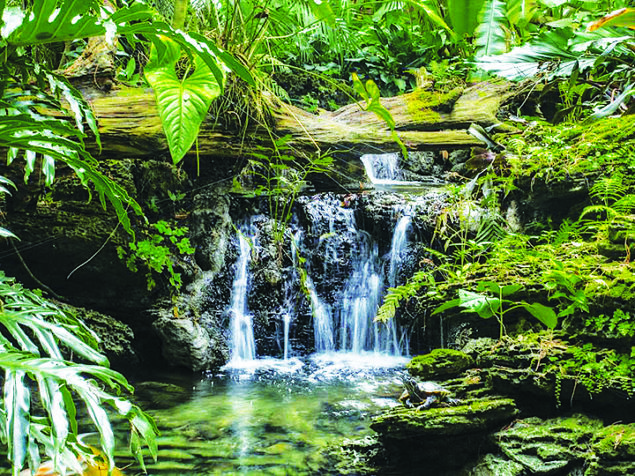There is so much more to Pinecrest Gardens than our recreational and cultural activities. We are fourteen acres of some of the most spectacular botanical phenomenon imaginable. When you walk through the lower garden you are exposed to a combination of rare and exotic species mixed in with one of the most extraordinary native landscapes in South Florida. Pinecrest Gardens is a lush paradise featuring both exotic and native tropical plants, sinuous rock formations, and winding water features. It truly lives up to its reputation as a hidden treasure and urban oasis. The garden contains three acres of tropical hardwood hammock and two acres of native cypress slough.
Remnants of the original Snapper Creek streambed wind through the eastern portion of the property. The streambed located on the garden property is the only portion of Snapper Creek that has not been altered by development. The site features Karst and Pinnacle rock formations, formed by the dissolution of bedrock by subterranean drainage. The bedrock is porous oolitic limestone and has been used extensively as a building material at the site. The eastern section of the Gardens contains numerous small caves, fissures and dramatic cliff overhangs. Solution holes, caused by erosion of the stone by both surface and subterranean water flow, contain water all year long and support fish, turtles, blue crabs, and other wildlife. One solution hole is estimated to be 30,000 years old.
The northeastern portion of Pinecrest Gardens features a one-acre cypress slough with bald cypress, a deciduous conifer, along with cypress knees, and an undergrowth of ferns. The cypress hammock was once part of the largest cypress forest in South Florida. At one time, before the rapid urbanization of eastern Miami, it was connected to the Big Cypress Swamp, located 50 miles west of Miami. Until Hurricane Andrew in 1992, the slough featured a number of trees over 100 feet tall. Unfortunately, about 60 percent of the tall trees were lost due to the storm. After the hurricane, seedlings began to naturally appear in the slough, which is a rarity. Many survived and have reached heights of around 20 feet.
A rock ridge shelf indicates a transition between the cypress and a hammock of hardwood trees to the southwest. The tropical hardwood hammock, consisting of live oak covers 3.3 acres. Pinecrest Gardens features a diverse selection of trees that include rare and signature specimens of Talipot Palms and Calabash. As the park was expanded, native pine trees were cleared from the western portion of the site and replaced with palms, figs, rubber trees, and banana plants. A Banyan tree was planted near the center of the site in 1947 to help fill in the cleared areas. The Banyan, a type of fig tree, develops prop roots that extend vertically down from its horizontal branches. Today, the signature Banyan Tree at the center of the property has spread to cover over 3/4 of an acre.
In addition to the trees listed above, the site features more than 1,000 varieties of rare exotic and tropical plants, including many types of ferns, fig trees, orchids, hibiscus, and other flowering plants. Other notable trees include a 100-year-old Cocoplum, a champion Pond Apple, and a venerable Sausage Tree. An open grassy meadow, with diverse plantings around its perimeter, is situated near the center of the site. A terraced succulent garden was developed in the 1960s and is located between Swan Lake and the Meadow. Pinecrest Gardens is also home to a diverse desert gardens and features specimen plants imported from Mexico.
The diverse elements of the gardens are accessed via meandering curved pathways that link all of the buildings and major structures. Parts of the path are paved with brick laid in decorative patterns. The brick paving is located in the western portion of the site in areas to the north and south of the Meadow. Some areas feature mosaics made from broken or cut brick pieces. The inlaid patterns feature leaves, flowers, flamingoes, snails, and various other shapes. The combination of forested areas, riverine landscapes, theme gardens, desert gardens, and open vistas make Pinecrest Gardens a unique visitor experience for every age and interest.
If you are interested in learning more about our garden or horticulture in general we invite you to volunteer…we can always use the help. To explore horticulture volunteering opportunities both in the field and in the nursery contact our Educational Coordinator, Lacey Bray or Horticulturist, Harvey Bernstein at 305-669-6990.
Once a month we host a wonderful workshop that addresses topics like edible gardens, orchid care and even classes in the art of bonsai. We are also home to several plant societies here in the South Florida area including:
Bonsai Society
Meetings 7:00 p.m. – 10:00 p.m.
Every second Tuesday of the month.
South Dade Amateur Orchid Society
Meetings 7:00 p.m. – 10:00 p.m.
Every second Thursday of the month.
IKEBANA
9:00 a.m. – 2:00 p.m.
Every third Tuesday of the month (excluding July).
Pan Am Orchid Society
6:00 p.m. – 9:00 p.m.
Every third Tuesday of the month.
The South Florida Orchid Society
6:00 p.m. – 9:00 p.m.
Every third Wednesday of the month.
Dade Chapter FL Native Plants Society
7:30 p.m. – 10:00 p.m.
Every fourth Tuesday of the month.
We would also encourage you to check out the Pinecrest Garden Club, which is on hiatus for the summer but runs wonderful monthly meetings, some at Pinecrest Gardens and others at botanical sites around South Florida.
The Pinecrest Garden Club
11:30 a.m.-1:30 p.m. Lunch Meetings.
Every second Tuesday of the month.
For further information on any of the activities listed in this column or to become a member of any of our domiciled plant societies or clubs call Lacy Bray or Elis Miarlles Rodriguez at 305-669-6990.









